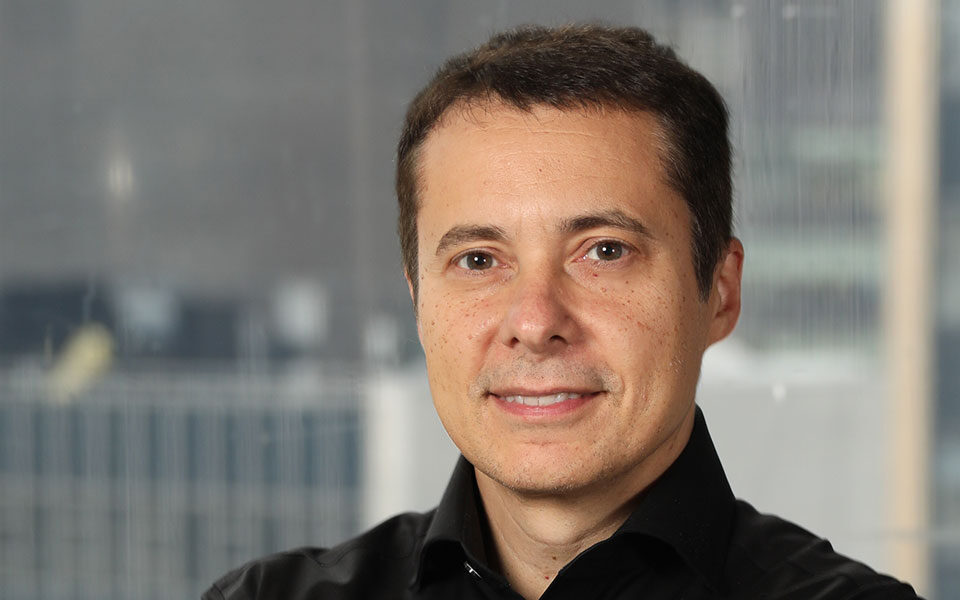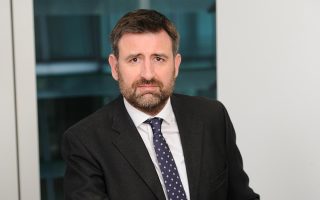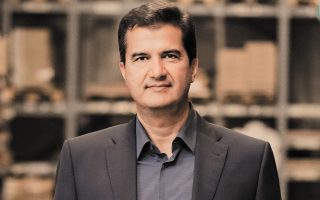‘I had no doubt there was talent here’
Head of wholesale payments at JPMorgan’s Corporate and Investment Bank (CIB) hails investment in Greek startup Viva Wallet

JPMorgan Chase & Co recently announced an agreement with Greek digital banking and payments firm Viva Wallet for the acquisition of an ownership stake of around 49%. Speaking to Kathimerini, Takis Georgakopoulos, head of wholesale payments at JPMorgan’s Corporate and Investment Bank (CIB), adds that the US banking giant also has plans to set up a tech hub in Greece, its first on European territory.
“We are thinking of building a tech hub here in the immediate future that will focus on three areas: cryptography, distributed ledger technology (DLT), artificial intelligence (AI) and machine learning related to payment systems. JPMorgan is the leading bank in all these three areas,” Georgakopoulos says. He adds that the hub will be set to launch by the end of 2022, “once we have found the right person to set it up and run it.”
The US bank is eyeing more than a small tech lab. For a hub to succeed, Georgakopoulos says, “it must be of some size so it can attract the right people and offer them opportunities for development. It makes no sense to invest in every country out there, recruiting five people here and 10 people there. What prospects can you offer them, how can you manage them? Our Israel hub is doing very well, currently employing a few hundreds of people.”
The decisions behind the Viva deal and the hub plan were not influenced by his Greek heritage nor that of JPMorgan’s board chairman and CEO Jamie Dimon. “Finding scientists with this expertise is hard. Hiring such people in Silicon Valley is almost impossible. We have been thinking about Greece for two years. After the Viva deal, we will be visiting [Greece] more often, so it will be easier. We will find the right person and make a start with one of the three areas,” he says.
Investing in Viva was based on purely financial criteria. “Greece just happened to have what suited our needs,” he says. It is part of a broader strategy designed to make the US bank a leader across all regions and areas of activity, including payment systems. And although the company may be well-placed in the United States, the same cannot be said for Europe.
“The European market is fragmented. Every country has its own payment system and regulatory framework, there are many different cards and so on. Had we chosen to build what we purchased in every country in Europe, it would take an awful lot of time. The advantage of companies like Viva, which are set up in a small country but still have international ambitions, is that they must find ways to deal with this market fragmentation. The thing about Viva’s technology is that it is easily adaptable. So whenever it enters a new country with a new payment system, it does not have to write new code but to simply adjust the existing code. This was very important to us. Furthermore, it has a philosophy, method and mentality that is similar to ours. It was the ideal fintech given our plans for Europe,” he says.
Georgakopoulos says he was pleasantly surprised by Viva, as he did not expect to find a company of its kind in Greece. “I had no doubt the country had talent, I just didn’t know that there was a company that had tapped into this talent to become a truly European company. When I first met with Haris [Karonis] and Makis [Antypas], the co-founders of Viva, I realized they had this European orientation,” he says. Meanwhile, he reconnected with some familiar faces at Viva as “many of the people were NTUA graduates. In fact two of its senior executives were pursuing a PhD at NTUA at the same time as me,” he says.
After getting his degree and PhD at the National Technical University of Athens, Georgakopoulos moved to New York in 1998 to continue his studies at Columbia University. A year later he became a partner at McKinsey & Company before taking the next big step in 2007. “I received a call from a former McKinsey executive who was then Jamie’s right-hand man and told me they were looking for a new head of strategy. That’s when I first met Jamie,” he says, referring to Dimon.
Georgakopoulos experienced the global credit crunch from that post and JPMorgan played a key role in rescuing the US banking system. However, taking stock on those crucial days for the global financial system, he admits that “acquisitions have given us capabilities we would otherwise need years to acquire.
“Thanks to [Washington Mutual] we gained access to the entire west coast of the USA, while thanks to Bear we gained access to brokerage activities,” he says.
Georgakopoulos has been in charge of wholesale payments since 2017. “It’s real-time payments and all the ways in which you can send money. JPMorgan and Citi were top at this but there was room for major innovation. We built a cloud-based platform with new methods of payment. My conviction was that payments would be made 24/7, anywhere in the world. This requires different infrastructures, different customer support, but also partnerships with major technology platforms and major players in e-commerce. We invested in this sector and our market share went up from 4.6% in 2016 to almost 8% today. At the moment, $10 trillion is traded through our platform daily. A total 4,000 transactions are carried out every second,” he says.
As the sector grew, Georgakopoulos says, fintech companies built an ecosystem with customer-friendly applications. At the same time, banks either gave up their involvement in the sector or failed to remain competitive. “I took over that sector two years ago and we are in the phase of modernization to compete with fintech.”
It was in this context that the deal with Viva came along, putting JPMorgan “in a very good position in relation to the competition in the European market,” he says.
Asked about the country’s prospects, he says there is a “very positive idea about Greece” in the US right now. “After the adventures of the previous decade, the country appears to be back on a stable path and on a growth trajectory. As a Greek, I am much more optimistic than any other time over the previous years.”





